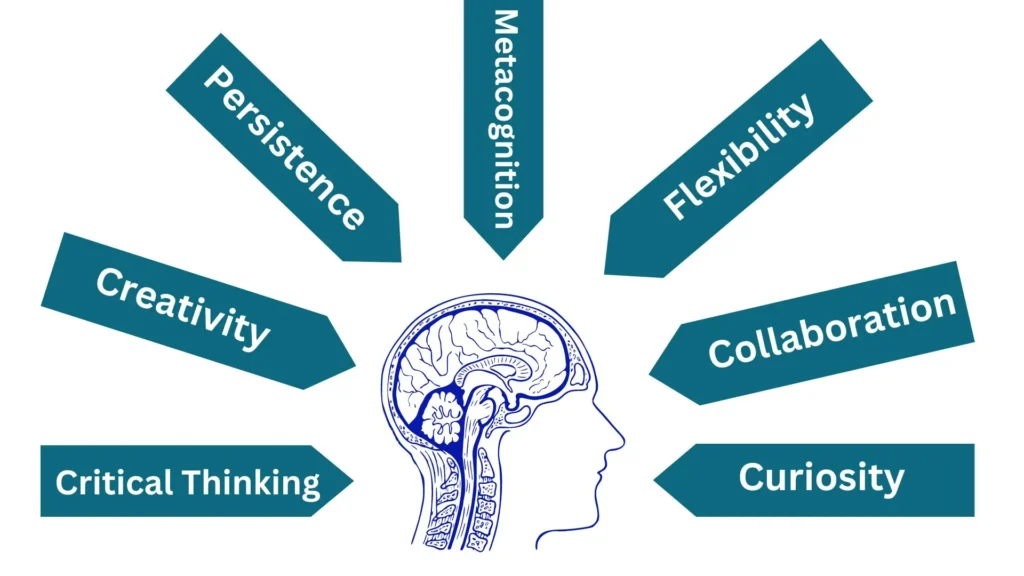Similar to other habits, there are also habits of mind. But what exactly do we mean by habits of mind? They refer to the brain functions that allow us to perform various actions.
These habits are ways of thinking that effectively assist individuals in approaching problems, decisions, and challenges.
While these habits are not inherent, they can be nurtured and enhanced through practice. From critical thinking to curiosity, this blog discusses habits of the creative mind that help in personal growth and success.
Each habit is related to real-life examples and practical tips for implementation. Also, it offers readers a roadmap to assess and enhance their cognitive abilities and emotional intelligence.
Table of Contents
Importance of Habits of Mind
Habits of mind are crucial in enhancing our ability to think critically and creatively. For example, persistence helps us tackle problems by fostering a strategic mindset.
These habits also contribute to achieving efficient outcomes and improved performance. Moreover, they promote self-awareness and reflection, which are vital to personal growth and development.
Ultimately, developing habits of the creative mind can significantly enhance academic, professional, and personal success.
7 Important Habits of Mind
After knowing what are habits of mind? You can improve your cognitive skills and abilities with 7 essential habits of mind. The list proceeds as below:

1. Critical thinking
Critical thinking involves analyzing, evaluating, and interpreting information to make well-informed judgments. It is a cognitive skill that helps us make sense of the world around us.
A person who practices critical thinking tends to have a more comprehensive and constructive worldview. They consider multiple perspectives before forming conclusions. This is particularly beneficial for students to develop healthy habits and learn new concepts.
This habit of mind is crucial in various aspects of life, including academic pursuits, problem-solving in professional environments, and making informed decisions in daily life.
We must justify and contemplate our values and choices to lead a meaningful life and organize our actions accordingly. Critical thinking also equips us with the means to engage in self-assessment.
2. Creativity
Creativity, one of the vital habits of the creative mind, has spurred remarkable inventions throughout history, including groundbreaking technologies like AI.
Creative individuals excel not only at problem-solving but also at generating fresh ideas and approaches. They think expansively, linking seemingly unrelated concepts and embracing novel perspectives.
Moreover, creativity extends beyond mere problem-solving; it drives innovation across various disciplines. Creativity fuels progress and drives societal change, from scientific breakthroughs to artistic endeavors. For instance, the development of AI requires innovative thinking to conceptualize and implement.
Developing creativity as a habit of mind enhances one’s ability to innovate and adapt, proving invaluable in personal and professional spheres. Creative thinking often leads to groundbreaking discoveries, new inventions, and diverse forms of artistic expression, enriching the individual and society.
3. Persistence
Persistence is a critical ingredient in the recipe for success; as Aisha Tyler aptly says, “Success is not the absence of failure; it’s the persistence through failure.” This sentiment underscores the importance of perseverance in the face of adversity.
To be persistent is to be unwavering in your efforts, even when faced with setbacks. It is the determination to push through challenges to reach your goals. This attitude of resilience and tenacity leads to a more steadfast and empowered lifestyle, making it a crucial habit, especially for students.
Persistence is vital in the habits of mind list, whether in academics or professional endeavors. It is the driving force that keeps individuals committed to their objectives despite the obstacles they may encounter. By cultivating persistence as a habit of the creative mind, individuals can enhance their ability to achieve success and overcome challenges in all areas of life. For example, you can achieve success by persistently practicing high performance habits.
4. Metacognition
Metacognition is the process of reflecting on and understanding our thought processes. It plays a crucial role in learning, problem-solving, and decision-making.
It is one of the productive habits of mind. Being aware of our thinking allows us to gain better insights into situations. Hence, it gives us more control over our lives and helps us assess our strengths and weaknesses more effectively.
One key aspect of metacognition is the ability to monitor our thinking. This involves paying close attention to how we approach tasks and recognizing when we need to adjust our strategies.
For instance, if we’re struggling to grasp a concept like habit stacking, metacognition enables us to realize that a different approach or seeking assistance may be necessary.
Furthermore, metacognition entails evaluating our thinking processes. This means assessing the efficiency of our strategies and making necessary adjustments.
For example, following the completion of a task, we can reflect on its outcomes to identify areas for improvement, thus enabling us to learn from our experiences and make more informed decisions.
5. Flexibility
How many of you appreciate stubbornness in others, those who refuse to consider any viewpoint other than their own? None, right? That’s why it’s important to be flexible and adaptable when developing habits like improving sleep habits for migraines.
Being flexible makes you more welcoming and non-judgmental, respecting everyone’s opinion. It allows you to consider alternative perspectives and solutions, leading to more innovative outcomes and better problem-solving. This mindset also helps you navigate uncertain or changing circumstances with greater ease and resilience.
Moreover, flexibility is essential in habits of mind list because it encourages lifelong learning and growth. It inspires you to seek new experiences and knowledge, embracing challenges as opportunities for development. This approach can lead to greater personal and professional success and a more fulfilling and enriching life.
6. Collaboration
Embracing collaboration as a mindset is one of the significant habits of mind. It emphasizes social responsibility and interconnectedness, highlighting the value of working together for shared goals.
It encourages consideration of the impact of our actions on others and the environment, fostering a sense of community and stewardship.
You may have encountered the phrase “Teamwork makes the dream work” numerous times, but have you ever reflected on its truth? It emphasizes the importance of working cooperatively to achieve a common goal.
This mindset also includes resolving conflicts, as those who value collaboration understand the significance of finding common ground and addressing disagreements constructively.
In essence, collaboration as a mindset fosters a culture of mutual respect, trust, and shared responsibility in both personal and professional contexts.
7. Curiosity
Curiosity is a fundamental human trait, as evidenced by Einstein’s self-described “passionate curiosity.” It drives individuals to seek understanding and explore the world. This eagerness is habit of the creative mind that fuels a constant quest for new knowledge and experiences.
Additionally, curiosity fuels personal growth by inspiring individuals to tackle challenges and expand their perspectives. It encourages creativity and innovation by prompting individuals to connect different ideas and apply their knowledge in new ways.
What are Habits of Mind for Students?
Students can adopt specific thinking and approaches to become more efficient learners. These habits of mind encourage students to be curious, persistent, flexible, and creative in their studies.
- Creativity: Students are encouraged to showcase their creativity skills and explore new ways of problem-solving
- Curiosity: A curious student is more likely to display a better understanding of the world around him owing to his eagerness to explore
- Critical thinking: a good student should also be a good critic who can analyze and evaluate different perspectives and opinions before him
- Collaboration: Students work collaboratively with others, learning to communicate effectively, listen actively, and contribute to a shared goal.
- Responsibility: Students should be responsible for managing their time effectively and setting achievable goals.
- Flexibility: Students should be adaptable, open to change, and willing to revise their thinking and approach based on new information or feedback.
- Ethical reasoning: A responsible student shows ethical reasoning by being accountable for their actions.
Conclusion
Habits of mind are the mental dispositions or ways of thinking that individuals develop over time to approach various situations and challenges. These habits of the creative mind are not innate but are cultivated through practice and reflection. They play a crucial role in shaping how individuals perceive and interact with the world around them. In the context of education, habits of mind are particularly important as they influence how students approach learning, problem-solving, and decision-making.
FAQs
How do habits of mind differ from other types of habits?
Mind habits refer to the cognitive practices individuals develop to approach problems, decisions, and challenges effectively. Unlike other habits, such as daily routines, habits of mind are more about mental dispositions and ways of thinking.
How can students cultivate habits of mind in the classroom?
By actively participating in activities that encourage creativity, critical thinking, collaboration, and perseverance, students can develop habits of mind in the classroom through practice and reflection.
How do habits of mind contribute to personal and professional growth?
All of the mind habits are those of successful individuals who excel not only as a person but professionally as well. These habits enable individuals to approach challenges more thoughtfully and strategically, leading to more successful outcomes.
Why are habits of mind important for students?
Mind habits play an integral role in shaping an individual’s worldview. They provide a framework for the overall cognitive ability of an individual. They contribute to academic, professional, and personal success by enabling students to approach learning and problem-solving more effectively.




